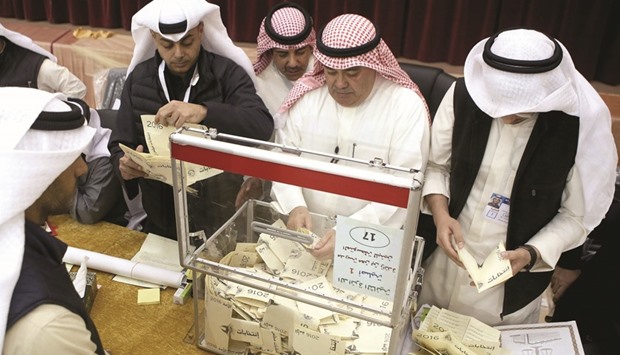Kuwaitis turned out in large numbers yesterday for the first election contested by the opposition in nearly four years amid fresh disputes over cuts in subsidies due to falling oil revenues.
Turnout was high with some polling stations reporting that 80% of eligible voters had cast their ballots by the time polls closed at 8pm (1700 GMT), according to state-run Kuwait Television.
Vote counting started at some centres but final results are not expected before early today.
While Kuwait’s two previous elections yielded poor turnout due to opposition boycotts, voters said they were encouraged by seeing their candidates running this time around.
“Their return is needed to strike a political balance in the country.
They are more capable of monitoring the government actions,” retired voter Ibrahim al-Tulaihi said at a polling station south of Kuwait City.
“A wise opposition is needed because we don’t want more political disputes,” Jarrah Mohamed, a government employee, said after casting his ballot.
The election comes against a backdrop of discontent among Kuwaiti citizens over mounting cutbacks in the cradle-to-grave welfare system they have long enjoyed as a slump in world oil prices hits government revenues.
The emir dissolved the last parliament after MPs called for ministers to be grilled over the cuts to state subsidies.
Islamist opposition candidate Hamad al-Matar, a former MP, said he expects the opposition to win a good number of seats in the 50-member parliament to prevent the government from raising charges.
“There will be no charges on citizens because we have no problem with finances,” Matar said.
The opposition is fielding 30 candidates among a total of 293 hopefuls, including 14 women.
“We want the next parliament to stop the government from hiking prices,” said pensioner Maasouma Abdullah.
But others said they could accept a slight raise because of dwindling oil revenues.
“I think we should accept some reasonable raises but not on power and water. Oil revenues have dropped sharply and we should take measures,” voter Jabr al-Jalahma said.
Opposition candidates campaigned heavily for economic and social reform and an end to what they charge is rampant corruption.
The election comes with Kuwait facing its most acute budget crisis in years.
Oil income, which accounts for 95% of government revenues, has nosedived by 60% over the past two years.
Kuwait posted its first budget deficit of $15bn last year following 16 years of surpluses.
Kuwaiti citizens make up around 30% of the emirate’s population of 4.4mn. A total of 483,000 are eligible to vote.

A Kuwaiti judge and his aides count the ballots at a polling station at the end of the vote in the Sabah al-Salem district on the outskirts of Kuwait City yesterday.
